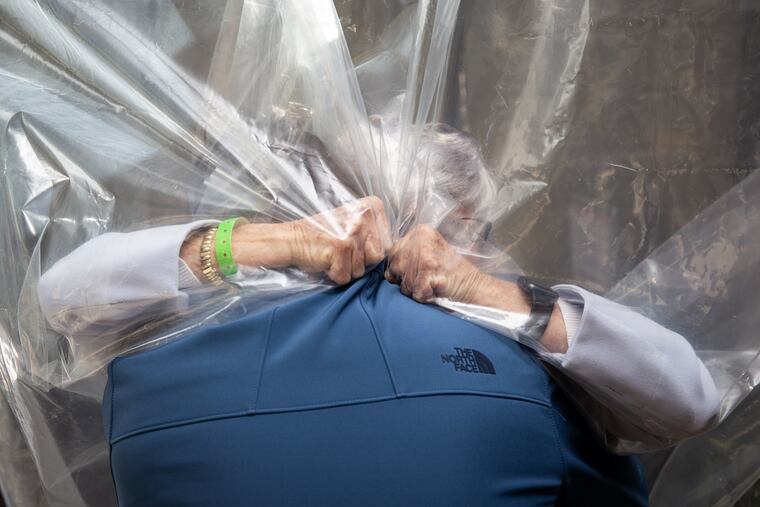Through crinkly plastic, fierce embraces fight the loneliness of COVID-19 at a senior center
“For less than $100, our maintenance guys came up with this" - a square of PVC piping hung from the portico of one of the entrances, with clear shower curtains hung all the way around.

VIRGINIA BEACH, Va. — Gary Witzenburg was stunned by what happened, wiping away tears with the back of his rough, 52-year-old hands as he sidestepped away afterward.
Same with his mother, Gay Dixon, a 76-year-old, hair-done, born and raised Southerner who dressed up in an unstructured blazer for the occasion and was so shocked by the way it went, she unleashed a streak of salty words. We’re not talking “darn” or “shucks.” She went all the way blue.
What happened?
The mother and son hugged.
“I did not expect that,” Witzenburg said, after embracing his mom for the first time since March, through a plastic “hugging wall” that the folks at Dixon’s senior community created. They clung to each other for hug after hug, both of them sobbing, Dixon cursing, the plastic shower curtain crackling.
Human touch has serious power, and while every touch between humans has the potential to transmit the coronavirus, the absence of touch is a slow, dull pain of its own.
“Ironically, at a time when we need all of this, we’re not getting it,” said Tiffany Field, director of the Touch Research Institute at the University of Miami’s Miller School of Medicine.
Field has studied touch for more than four decades. She said it has deep biological impacts on our bodies.
“People emotionally are very excited to see other people, but when they go to hug each other, it’s more than an emotional experience,” Field said.
Applying pressure to a body sets off chemical and electrical internal workings that zing and ping through our nervous systems. Our heart rate slows, our blood pressure slows, the brain waves turn to theta, which Field said is the oscillating pattern of electrical energy that emerges when we meditate, relax, or are about to go to sleep.
The production of stress hormones — namely cortisol — also slows. Cortisol targets natural killer cells — the cells that help enhance immunity. So without it, our natural immunity has a fighting chance, which is exactly what you want in a pandemic.
“It’s like that 15 cigarettes a day thing,” said Amy Sheyer, who does public relations for Westminster-Canterbury on Chesapeake Bay, the senior living community in Virginia Beach where Dixon finally got to hug her son. She was citing an often-quoted study that measured how harmful loneliness can be.
“Loneliness has the same impact on mortality as smoking 15 cigarettes a day,” according to Douglas Nemecek, the chief medical officer for behavioral health for Cigna, which did the study.
Hugs are like hand sanitizer for your internal anatomy — no need to drink bleach.
And the folks at Westminster-Canterbury wanted to find an easy way to address the mental health as well as the physical health of their vulnerable community.
“We wanted people to get their holiday hug — we know how important that is,” said chief executive Ben Unkle.
So far, they’ve had only two cases of coronavirus in their population of more than 760, and those two were part of the group who had visits with outside family members, Unkle said.
It’s a remarkable success rate given that cases in Virginia are spiking, and Virginia Beach alone has had nearly 12,000 cases and 119 deaths, according to the Virginia Health Department’s count.
There are nursing homes and communities across the nation that have tried similar contraptions. Some use gloves or neoprene. They are often flimsy, costly, and complicated.
“For less than $100, our maintenance guys came up with this,” Unkle said. It’s a square of PVC piping hung from the portico of one of the entrances, with clear shower curtains hung all the way around and taped together to form a tight barrier. The sanitation crew comes in and cleans it after each hug session.
On a windy day last week, Dudley Haynie, 86, ducked into the clear stall to hug a carbon copy of himself, his 56-year-old son, Mark Haynie.
“You don’t understand the power of touch until you’ve lost it,” the son said. The two have had appointments at the hugging wall before, so last week’s hug wasn’t as emotional as the first time they did it.
It’s a popular attraction that’s usually booked solid.
When Dixon’s son, who runs a restaurant in North Carolina’s Outer Banks, finally got to visit after beach season ended, she snagged an early appointment.
“You let your hair grow long,” Witzenburg told his mother, as they awkwardly greeted each other at the outdoor living room, rocking chairs separated by a huge plexiglass partition and surrounded by poinsettias and holiday decor.
“I just got it cut! You can’t tell?” she said. “I’ve gained weight.”
“No, you can’t tell, Mom. You look great,” Witzenburg said. He’s a good boy.
They talked about his shoes and mask and other things before shuffling over to the hugging station. And they hugged. And let go. Then hugged again.
In the mommest move ever, Dixon looked way up at her towering boy and held his face between her plastic-covered hands while they both sobbed. Their hug lasted almost a minute and half. They had a hard time letting go.
“We do a lot of Zoom, but it isn’t the same, not like this,” Dixon said.
» FAQ: Your coronavirus questions, answered.
Witzenburg sat back down in the rocking chair, exhausted by his unexpected reaction.
“I just haven’t felt her warmth in too long,” he said. “I’ve held her forever, but it wasn’t ever like this.”